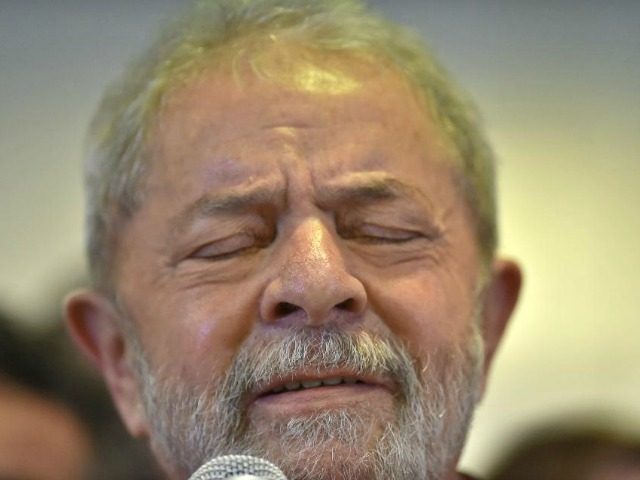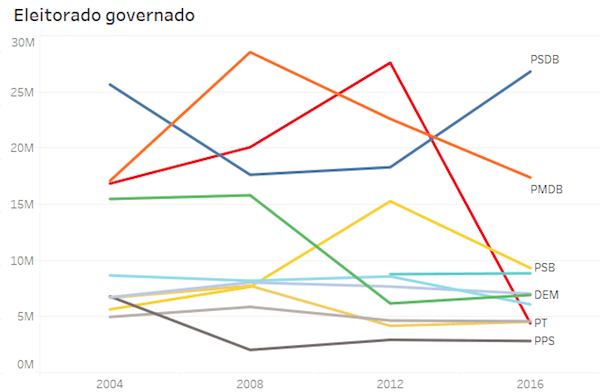The group whose founder called “the most important leftist party in Latin America” suffered a tremendous electoral collapse on Sunday. Brazil’s Workers’ Party (PT) is now in charge of the mayorship of only one of the nation’s regional capitals, losing even its home city of Sao Paulo.
The Workers’ Party is now in control of fewer than half of the regional capitals it controlled in 2012, the party’s heyday, when former President Dilma Rousseff was at the summit of her popularity. Rousseff’s profile fell dramatically earlier this year as the nation’s Congress voted to impeach her and the Senate confirmed her ouster in August.
The PT won only one mayorship in Río Branco, the capital of far west Acre state, on the border with Peru. One of its candidates, Joao Paulo, also made it into a runoff election in Recife, the capital of Pernambuco, on the coast, but there are no guarantees that the election will go their way on October 30. Media reports from the region have referred to the defeat as the worst of its kind in three decades.
Among the most embarrassing for the PT was the loss of Sao Paulo, the city that saw the party born in 1980. Incumbent Fernando Haddad was soundly defeated by Joao Doria, a businessman with no prior political experience, running with the Brazilian Social Democratic Party (PSDB), a center-right party.
The Agence France-Presse also notes that the two candidates Rousseff had personally supported during the campaigns both lost.
The PSDB had the most to gain from the PT collapse, expanding its control of municipalities from 686 in 2012 to 793 this week and receiving the highest number of raw votes, according to Brazil’s O Globo. The PSDB’s members, known as “toucans” for their party mascot, have seen their star rise amid the leftist scandals engulfing the country, with one of the most prominent among them, Bruno Araujo, being appointed minister of cities under current President Michel Temer.
Painting a dramatic picture of the PT’s collapse, O Globo has published a graph showing the decline of the party (in red) in votes, compared to the trajectories of the various other parties competing for gubernatorial seats nationwide over time.
The wide rejection of the PT follows a tumultuous few months for its founder, Luiz Inácio Lula da Silva, Rousseff’s predecessor. While Rousseff was impeached due to misrepresentations of Brazil’s financial situation during her tenure, many Brazilians believed that she and da Silva must have had a role in the sprawling corruption scandal known as “Operation Car Wash,” in which PT and allied politicians – such as those of the center Brazilian Democratic Movement Party (PMDB) – made millions by systematically overcharging on contracts for the state-owned oil corporation Petrobras. In September, a court formally accused da Silva, president at the time of the scheme, of having played a role.
While Rousseff herself has never been directly implicated in the Petrobras case, despite having held the title of minister of energy at the time, she has been accused of misconduct in the cover-up of the corruption. Most notably, her relationship with da Silva aroused scrutiny in March, when she appointed da Silva her chief of staff. Da Silva had been detained for questioning regarding the corruption probe the day before, and the appointment would have granted him executive immunity. While Rousseff denied appointing him to protect him, a federal judge released a wiretapped conversation between the two in which Rousseff vowed to protect da Silva from prosecution by hiring him somewhere in his cabinet.
Da Silva maintains that he is being targeted because the PT is so popular, a difficult argument to continue making following this weekend’s election. “I am proud to have created the most important leftist party in Latin America, and having created the party when many people thought it impossible to create,” he asserted in September, claiming that, in a political race, “only Jesus Christ can beat me in Brazil.


COMMENTS
Please let us know if you're having issues with commenting.